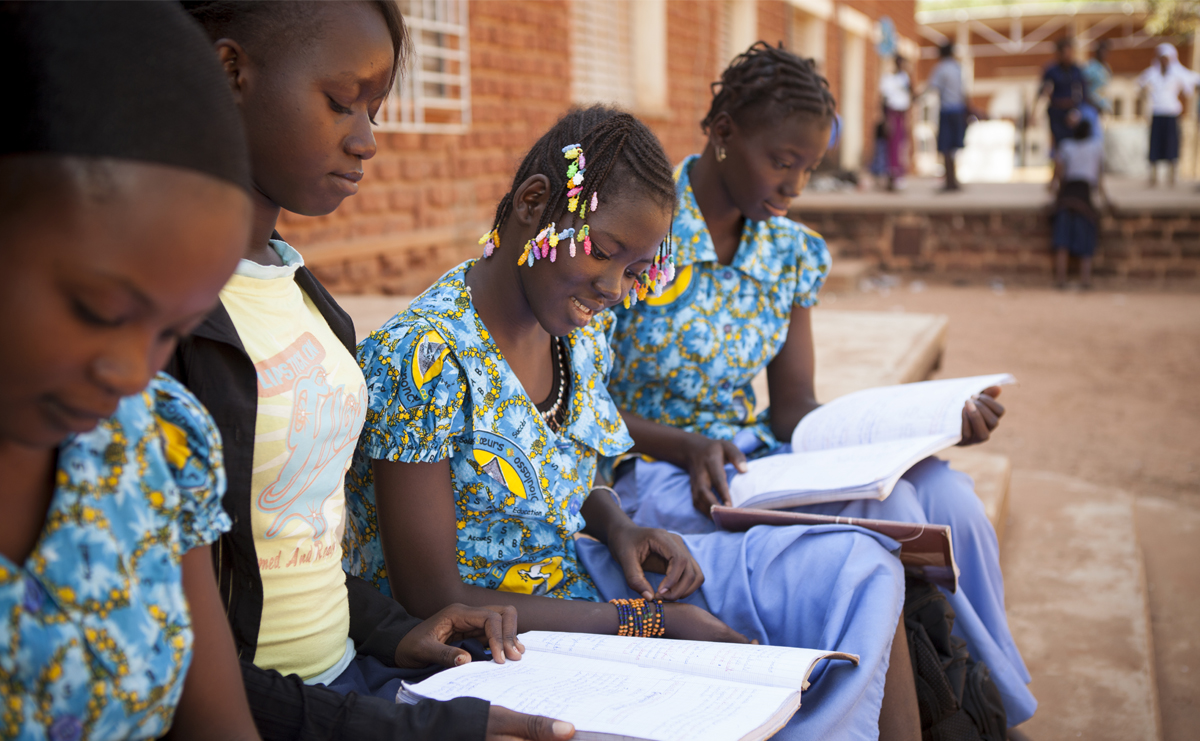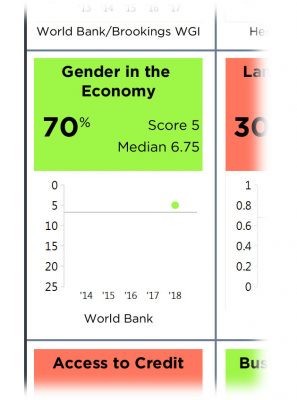Who We Are

Jake Lyell for MCC
Yanta (second from right) studies with friends in the courtyard of their school, which was improved through the BRIGHT 2 Schools project in MCC's Burkina Faso Compact. Yanta was the first girl from her family to attend school.
MCC’s Development Model
A cornerstone of MCC’s development model is evidence-based selectivity. Only those low or lower-middle income countries that meet MCC’s strict selection criteria can become MCC partner countries. Countries are assessed on 20 different indicators through the MCC scorecard. The scorecard draws data from independent third party institutions to transparently measure the extent to which countries are committed to economic freedom, social investment, and democratic governance. These are areas MCC sees as critical to creating an enabling environment for sustained economic growth.The MCC Effect
The clear incentivizing effect of MCC’s selection criteria is called “the MCC Effect.” That is, countries can use the MCC scorecard as a roadmap for reform, often before MCC invests a single dollar. In doing so, countries make critical reforms to boost policy performance, measured by the MCC scorecard, in hopes of qualifying for an MCC investment. MCC investments couple significant grant funding for large infrastructure with key policy and institutional reforms that aim to reduce poverty through economic growth. Further, countries that receive MCC investments are more attractive to private investment. MCC grants signal that a country has independently pursued policies critical to sustained economic growth and has the potential to catalyze reforms that can unlock further private sector investments.Gender in the Economy: A Critical Indicator

MCC's Scorecard
As such, MCC first introduced the Gender in the Economy indicator as a part of its scorecard in Fiscal Year (FY) 2012 to explicitly address women’s participation in the economy. The new indicator complemented existing gender-responsive indicators including Girls’ Education, Civil Liberties, and Land Rights and Access. The Gender in the Economy indicator is sourced annually from the World Bank’s Women, Business, and the Law report. Upon the inclusion of the Gender in the Economy indicator on the scorecard, passing this indicator became a priority for a number of countries seeking to become eligible for MCC programs. The introduction of the indicator ensured that the MCC Effect included incentivizing countries to increase women’s economic participation and gender equality.
Country example: Côte d’Ivoire
Côte d’Ivoire clearly exemplifies the MCC Effect, including as it relates to promoting women’s economic empowerment. The country went from passing 5 out of 20 indicators on the MCC scorecard in FY 2012, to 10 in FY 2015, to 14 in FY 2019. This impressive progress was led in large part by a dedicated committee (Comité National pour l’Éligibilité de la Côte d’Ivoire au Millennium Challenge Corporation), created by President Ouattara in 2011 and chaired by the Prime Minister, focused solely on becoming eligible for MCC assistance.An important component of the committee’s work focused on the Gender in the Economy indicator. By creating reform roadmaps that included gender, engaging with the Women, Business, and the Law team, and making critical reforms, the committee significantly improved Côte d’Ivoire’s performance on the indicator. Central to this improvement was the government’s passage of a revised family code which removed discriminatory measures preventing women from obtaining passports, from choosing jobs freely, and from the possibility of being the head of household in the same way as a married man.
Country example: Sierra Leone
Sierra Leone offers another strong example of the MCC Effect in action. After consistently passing the Gender in the Economy indicator, Sierra Leone failed the indicator in FY 2017 after the World Bank’s Women, Business, and the Law report determined that women did not have the same legal rights as men to pass citizenship to their children. In a swift response, members of the Government of Sierra Leone’s responsible unit, the Millennium Challenge Coordinating Unit, engaged with the Women, Business, and the Law team to understand the legal issue and then worked to rapidly pass a legal reform to guarantee equal rights between men and women in this regard. As a result of this legal reform, Sierra Leone passed the indicator anew.Expanding the Indicator, Expanding Gender Reforms
Since MCC created the Gender in the Economy indicator in FY 2012, the World Bank’s Women, Business, and the Law report has significantly broadened the scope of its data. As a result, in FY 2019 MCC decided to expand the indicator to better capture more of the Women, Business, and the Law data and more comprehensively capture women’s participation in the economy. This meant including additional factors such as gender-based violence, child marriage, and sexual harassment safeguards; legal protections of women’s inheritance and ownership of property; job restrictions; and women’s testimony in court, among other topics. In total, MCC expanded the indicator to cover 40 issue areas from 10 in FY 2012.MCC fully implemented the expanded indicator on all FY 2019 scorecards. While this represents a strong push by MCC to further encourage critical policy reforms around women’s economic empowerment, it also means that some countries that previously passed the Gender in the Economy indicator now fail due to the significant broadening of the scope of the indicator. Thus, MCC’s expansion of the Gender in the Economy indicator further supports the incentive effect of the MCC scorecard.
Gender is a Priority for MCC
Gender equality reduces poverty, boosts economic growth, and leads to more sustainable development outcomes. When women are empowered economically, they invest in their families and communities, spurring economic growth and creating more stable societies.MCC’s focus on gender in the economy aligns with the White House Women’s Global Development and Prosperity initiative (W-GDP), which prioritizes the critical role women play in driving economic success in nations around the world. Through the MCC Effect of the Gender in the Economy indicator, MCC incentivizes countries—both current and prospective partners—to focus on prioritizing women’s economic participation and empowerment as central to achieving their development goals.

